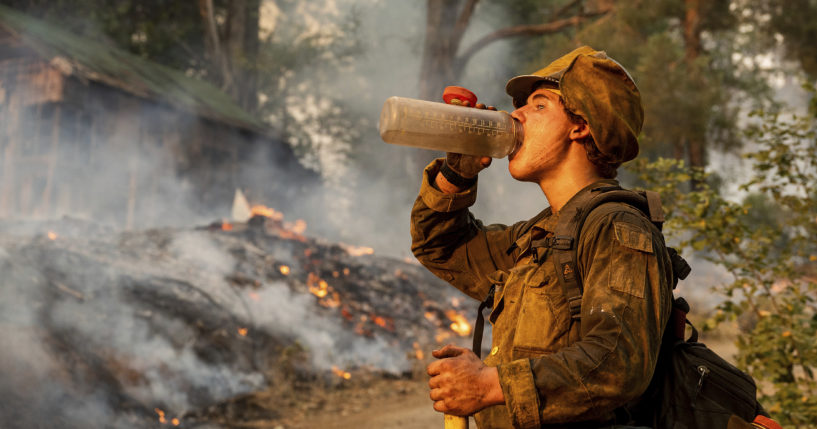
California Can't Catch a Break: Storms Slow Wildfires but Leave Firefighters Responding to New Type of Emergency
Calmer weather in Northern California helped firefighters battle a wildfire threatening thousands of mountain homes on Monday.
However, remnants of last week’s Pacific hurricane continued to produce thunderstorms that caused flash flooding in the southern part of the state, where crews made headway against another huge blaze.
The Mosquito Fire in the foothills east of Sacramento spread to nearly 73 square miles, with 10 percent containment, according to the California Department of Forestry and Fire Protection, or Cal Fire.
Forecasters predicted a respite from the hot and gusty weather that dogged firefighters last week, but possible fuel sources from fine grass to big trees remain very dry and flammable, according to a Cal Fire incident report Sunday night.
After a reconnaissance flight Sunday afternoon, Incident Commander Rick Young said that although the fire’s growth had slowed, “where it was burning, it was really burning.”
More than 5,800 structures in Placer and El Dorado counties were under threat, and some 11,000 residents of communities including Foresthill and Georgetown were under evacuation orders.
In Southern California, milder temperatures and rain aided crews battling the massive Fairview Fire about 75 miles southeast of Los Angeles after days of sweltering heat.
The 44-square-mile blaze was 49 percent contained Sunday night. The fire has destroyed at least 30 homes and other structures in Riverside County. Two people died while fleeing the blaze last Monday.
Thousands of structures are threatened by California’s largest wildfire this season, the Mosquito Fire, which has burned more than 46,000 acres — and is only 10% contained. https://t.co/GkoXWQJS3l pic.twitter.com/vEJfYiJ2yH
— CBS Mornings (@CBSMornings) September 12, 2022
The southern part of the state welcomed the cooler weekend weather after what’s left of Hurricane Kay veered off the Pacific Coast and faded, helping put an end to blistering temperatures that nearly overwhelmed the state’s electrical grid.
But unstable air persisted and powerful thunderstorms unleashed flash floods that inundated roads and highways across inland areas. More than 50 people were rescued after mudslides trapped at least 24 cars and a responding fire truck in the mountainous Lake Hughes area north of Los Angeles on Sunday. No injuries were reported.
Flood watches and advisories had mostly expired, but slow-moving thunderstorms were possible Monday, the National Weather Service said on Twitter.
To the north, remnants of Kay caused flooding Saturday that stranded about 40 vehicles and closed a stretch of State Route 190 in Death Valley National Park. The park is still cleaning up from floods five weeks ago that closed many key roads.
California’s Mosquito Fire has covered a large portion of the Northern Sierra region with smoke. State health officials urged people in affected areas to stay indoors when possible.
Organizers of the Tour de Tahoe canceled Sunday’s annual 72-mile bicycle ride around Lake Tahoe because of the heavy smoke from the blaze more than 50 miles away. Last year’s ride was canceled because of smoke from another big fire south of Tahoe.
The Mosquito Fire’s cause remained under investigation. Pacific Gas & Electric said unspecified “electrical activity” around the time the fire was reported on Tuesday.
Crews also battled major blazes that blanketed large swaths of Oregon and Washington in smoke.
In Washington, fire officials were scrambling to secure resources in the battle against a blaze sparked Saturday in the remote Stevens Pass area that sent hikers fleeing and forced evacuations of mountain communities. There was no containment Sunday of the Bolt Creek Fire, which had scorched nearly 12 square miles of forestland about 65 miles east of Seattle.
A few moments from the Bolt Creek fire today in Washington. (Daniel Kim / The Seattle Times) pic.twitter.com/3yT6Ffkqou
— Daniel Myungkyu Kim | 김명규 (@dkimreports) September 11, 2022
“The fire will continue to advance in areas that will be unstaffed. With limited resources, only point protection will be in place while resources continue to mobilize to the fire,” a Sunday morning incident report said.
Meanwhile, sprawling areas of western Oregon that were choked by thick smoke from the fires in recent days were expected to see improved air quality on Sunday thanks to a returning onshore flow, Oregon Public Broadcasting reported.
South of Portland, more than 3,000 residents were under new evacuation orders because of the 134-square-mile Cedar Creek Fire, which has burned for over a month across Lane and Deschutes counties. Firefighters were protecting remote homes in Oakridge, Westfir and surrounding mountain communities.
The Cedar Creek fire in central Oregon erupted to nearly 86,000 acres over the weekend, breaching existing lines. https://t.co/XEUqEa5eDy
⬇️PlanetScope imagery captured on September 6 and 9, 2022. pic.twitter.com/jJEntr5Uow
— Planet (@planet) September 12, 2022
According to the Northwest Interagency Coordination Center, this weekend there were more than 400 square miles of active, uncontained fires and nearly 5,000 people on the ground fighting them in Oregon and Washington.
The Western Journal has reviewed this Associated Press story and may have altered it prior to publication to ensure that it meets our editorial standards.
Truth and Accuracy
We are committed to truth and accuracy in all of our journalism. Read our editorial standards.
Advertise with The Western Journal and reach millions of highly engaged readers, while supporting our work. Advertise Today.










